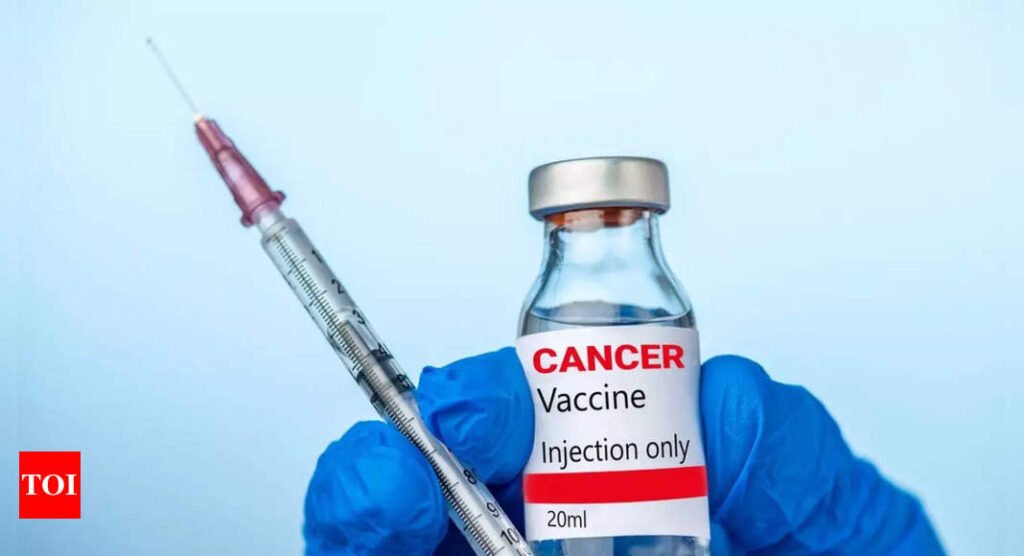Cancer occurs when cells in one part of the body grow and divide uncontrollably to form a tumor, which can spread to other parts of the body. Cancer vaccines train the immune system to protect the body from foreign invaders and abnormal cells. According to oncologists, these vaccines contain antigens that resemble tumors. When the body is exposed to it, it triggers an inflammatory response that builds immunity against cancer. Cancer cells are good at hiding from immune cells, allowing them to multiply because the body doesn’t recognize them. Vaccines help the body recognize these deadly cancer cells and allow it to fight them.
The cancers that can be prevented with vaccines are:
cervical cancer
The HPV vaccine is the only cancer vaccine currently available. A vaccine used against human papillomavirus. This virus is a sexually transmitted disease, and a vaccine is administered to prevent it. Three doses are administered at intervals of 0, 2, and 6 months. The vaccine can be given to children between the ages of 9 and 14. This is a preventable vaccine.
“This vaccine provides over 90% immunity against cervical cancer. Cervical cancer used to be the most common cancer among women, but now it ranks second, with breast cancer It has become the most common cancer in women,” said Dr Pooja Babbar. Consultant Medical Oncologist at CK Birla Hospital Gurugram.
“The vaccine is also recommended for unvaccinated teenagers and young adults aged 26 years,” says Dr Tanveer Aujla, senior consultant gynecologist at Maternity Hospital, Noida.
Anal cancer, head and neck cancer, penile cancer, vulvar cancer, vaginal cancer
All these cancers can be prevented with the help of the human papillomavirus (HPV) vaccine.
liver cancer
The hepatitis B vaccine helps prevent hepatitis B and reduces the risk of liver cancer. Hepatitis B is a liver disease caused by the hepatitis B virus (HBV). They range from a mild illness lasting a few weeks (acute) to a serious long-term illness (chronic) that can lead to liver cancer. Getting the hepatitis B vaccine reduces your risk of liver cancer.
“This can prevent hepatitis B infection from progressing to cirrhosis, and ultimately prevent hepatocellular carcinoma. This is because the majority of liver cancers are caused by hepatitis B infection. “This vaccination, the hepatitis B vaccine, also plays some role in prevention because we know it’s a disease,” says Dr. Baber.
bladder cancer
In bladder cancer, BCG vaccination is used to treat early stage malignancies. It is made from inactivated tuberculosis bacteria. When BCG is put into the bladder as a liquid through a catheter, it stimulates immune system cells to attack bladder cancer cells.
“This is an intravesical instillation, which means administering the vaccine intravesically. We don’t expose the body and we typically treat the early stages of bladder cancer, which is called non-muscle invasive. This actually accounts for the majority of cancer types. About 60 to 70 percent of bladder cancers are early-stage cancers,” says Dr. Barbour.
Chemotherapy is given for low-risk bladder cancer, while BCG vaccination is given for intermediate-to-high risk. This vaccine has been shown to prevent bladder cancer from progressing from early stages to advanced stages and also reduce recurrence rates.
prostate cancer
A vaccine called Sipuleucel-T is used to treat people whose prostate cancer has metastasized or spread. Immune cells are exposed to molecules from prostate cancer cells, which are then injected into the body. May extend survival for patients with metastatic prostate cancer.
There is also a dendritic vaccine that is effective against castration-resistant prostate cancer. In other words, dendrites are nothing but antigen-presenting cells. In other words, dendritic cells carry tumor antigens.
“This vaccine has actually helped us get good control rates for prostate cancers that are resistant to hormone therapy, and now we’re starting to see more and more applications of these cancer vaccines, especially in the United States. Research is underway and the main mechanism these vaccines fight are the very same antigens as tumor antigens, exposing your body to tumor antigens, inactivated viruses, and other particles. , your body triggers an inflammatory response in the form of other inflammatory cells and their particles. Cancer cells have immune surveillance capabilities that help gradually increase the immune response against cancer.” says Dr. Barbour.
Who should receive these vaccines?
– Vaccines such as hepatitis B are usually recommended for infants and children who have not previously received vaccines or for people who are at high risk of developing the disease.
– The HPV vaccine can be given to pre-teens and adults to reduce the risk of cervical cancer.
– BCG vaccine is ideal for patients with early-stage bladder cancer.
– Similarly, Sipuleucel-T (Provenge) is usually recommended for men diagnosed with advanced prostate cancer, says Dr Atul Narayankar, consultant medical oncologist at Wockhardt Hospital, Mira Road .
Other ways to prevent cancer
Cancer can be prevented through a combination of lifestyle modifications and necessary precautions. This includes eating a balanced diet, limiting sugar and processed foods, getting at least 45 minutes of physical activity a day, strictly avoiding smoking and alcohol, maintaining a healthy weight, and getting vaccinated. It will be. It’s important to keep up with regular check-ups, as they provide valuable information about your overall health and can help detect cancer early. To lower your risk of skin cancer, remember to wear sunscreen every time you go out.
Cervical cancer vaccine expected to be released soon: Adar Poonawalla

